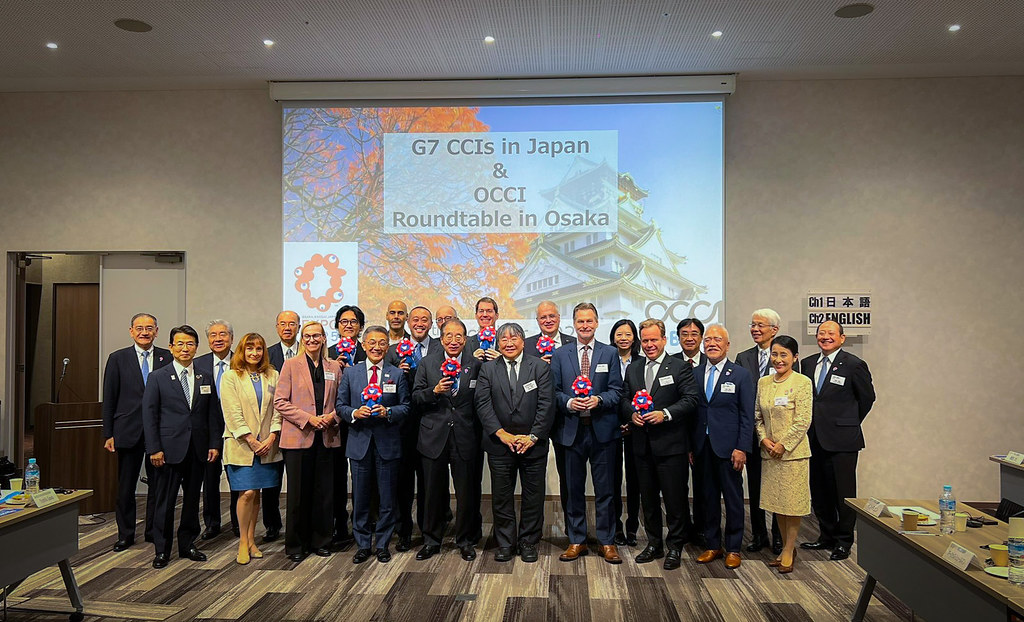Member? Please login
The Climate Crisis and Business

Written by Sterling Content
December 6, 2019
Past Event Round Ups
With climate an increasingly everyday consideration for people worldwide, members of the British Chamber of Commerce in Japan (BCCJ) met on November 21 to discuss the risks and opportunities it poses for business. The interactive workshop, “Tackling the Climate Crisis,” was part of the BCCJ’s 5.0 Project, which advocates the adoption of responsible business, digital & tech innovation and diversity & inclusion for sustainable business growth in Japan and the UK.
BCCJ Executive Committee member Tove Kinooka opened the event by encouraging attendees to think of the planet as a delicate ecosystem that is affected by both single and cumulative changes within it. Actions by individuals, teams, companies and nations therefore can have a knock-on impact across borders.
As co-founder of Global Perspectives, a consultancy offering organisational transformation solutions including on sustainability, Kinooka explained that the world is no longer experiencing simply “climate change” but instead a “climate crisis.” To tackle it, everyone should be asking themselves three questions: Must we change? Can we change? Will we change?
Must we change?
Kinooka pointed out the irrefutable evidence that the earth’s temperature is rising relative to growing levels of CO2 concentration in the atmosphere, bringing more extreme weather and natural disasters.
Heat records were set in 213 locations worldwide in 2018. In 2019, in Japan, 1,332 people died and some 71,000 were taken to hospital as a result of heatwaves. Meanwhile, in the UK, heatwaves are now twice as long as they were 50 years ago and are manifested in forest fires, flooding and other phenomena. For example, the UK is now home to two evasive species of mosquitoes capable of carrying West Nile virus, Zika and dengue fever.
Typhoon Hagibis, which hit a large swathe of Japan in October 2019, caused ¥102 billion in damage to the agriculture, forestry and fisheries industries, according to government data. Of that, ¥8.56 billion of damage was to crops, while ¥50.96 billion was to industry facilities. The knock-on effect has been rising prices, for example cucumbers are 80% more expensive than their pre-typhoon level.
Such phenomena, she said, affect not only people and communities but also businesses and the wider economy due to their impact on markets, infrastructure, trade, assets, the workforce and so on.
Can we change?
The good news, Kinooka told attendees, is that the world has the capability to tackle the climate crisis.
In renewable energy, the UK generated more than twice as much energy from wind as it did coal in 2017. In fact, April 2017 saw the UK generate no electricity from coal for the first time in 130 years. Throughout June 2017, 100% of households in Scotland were powered by wind.
Despite progress, including in the proliferation of electric vehicles and more signatories to the Powering Past Coal Alliance, most countries will not meet targets pledged in the 2015 Paris Agreement, which aims to keep global temperature rise this century to below 2 degrees Celsius above pre-industrial levels. While some countries, including Morocco and Costa Rica, are on target to exceed their goals, major polluters will be among those that fall short.
The Sustainable Development Goals set out by the United Nations provide a strong foundation on how the world can change its relationship with the environment. Though decided by governments with some input from big business, the goals are not only for governments, said Kinooka, pointing out that businesses can act faster and create longer-term strategies than governments. What’s more, with today’s scale of global business, corporations have the potential to make a large impact very rapidly.
Ultimately, though, the cornerstone of efforts should be collaboration—among individuals, communities, non-governmental organisations, not-for-profit organisations, businesses and governments. “None of us can tackle this by ourselves,” she said. “If we can get together, the effects can be magnified and accelerated.”
Solo journey
Lowell Sheppard, Asia-Pacific director of HOPE International Development Agency and founder of Navigate 22 (a consultancy focusing on ethics, sustainability and social legacy), spoke about his plan to sail solo to the Great Pacific garbage patch. Motivated by “helping people make choices today that will leave a legacy in our world for future generations,” Sheppard aims to experience three things: grief at the human impact on the planet, joy at the resilience of the planet and reverence at the expanses that will surround him.
While on the journey, which is expected to take three months, he will work with scientists to collect water samples that will be tested for plastic particles and radiation. He hopes to gain a deeper understanding of the climate crisis and engage children in his project. As about half of babies born in the developed world this century are expected to reach their 100th birthday, he said everyone should be motivated by the kind of world that their children and grandchildren would inherit.
Steps for businesses
Attendees considered the climate-related risks to their businesses, including damage to infrastructure, supply chains, political and market stability, staff health, productivity and product quality. If extreme weather or a natural disaster were to occur, a company’s focus would be on repairing and rebuilding rather than development, land may become uninsurable and business contingency plans would need to be implemented.
Most businesses understand that they need to play their part in tackling climate change but are unsure how to start and what they can do within their sphere of influence, said attendees. Greater innovations in technology are needed to support the work and big businesses need financial incentives. Some attendees suggested that reform to regulatory environments and workplace culture alongside a shift within firms from an obligation-based mindset to a compliance-based mindset would be helpful.
In closing, Kinooka said that the climate crisis also brings opportunities—to change the way operations are done and ensure a responsible, sustainable ongoing approach to business. “We can make new models and create a positive impact, starting on the small things,” she said.







